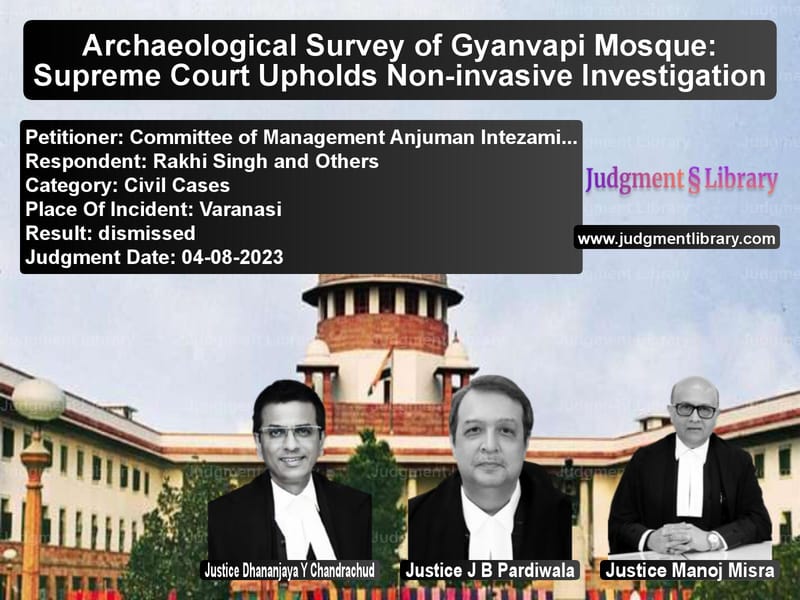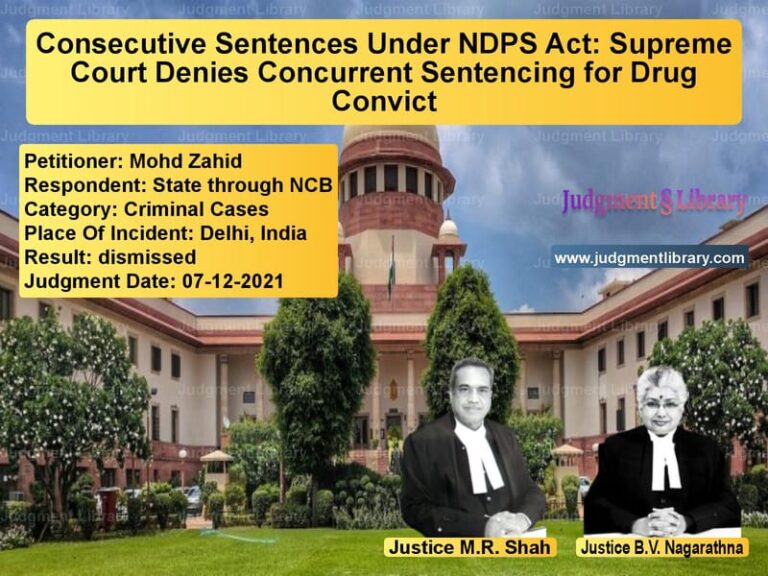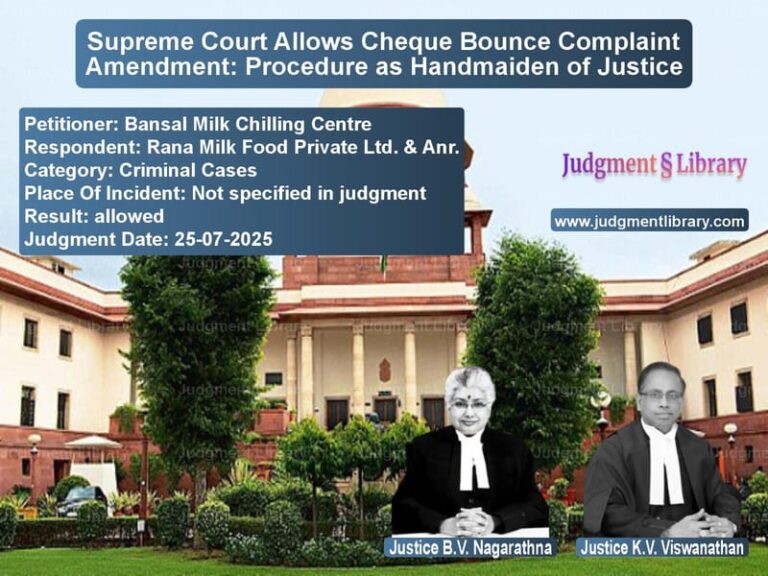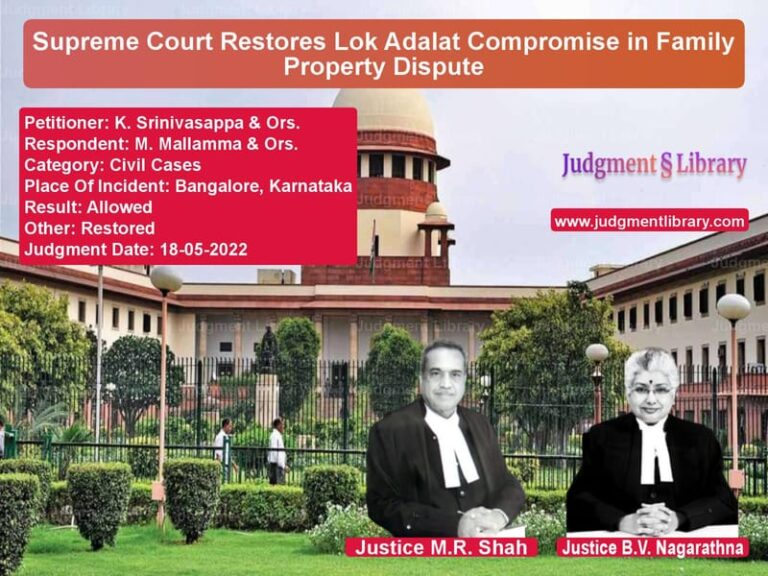Archaeological Survey of Gyanvapi Mosque: Supreme Court Upholds Non-invasive Investigation
The Supreme Court of India recently adjudicated a highly sensitive and complex case involving the Gyanvapi Mosque in Varanasi, a historical religious site claimed to have a Hindu religious structure beneath it. The case centers on the request for an archaeological survey to determine the presence of a Hindu temple structure beneath the mosque. The Court’s decision has significant implications for religious and archaeological investigations at historically contentious sites. The petitioners, led by the Committee of Management of Anjuman Intezamia Masajid, challenged the direction for a survey by the Archaeological Survey of India (ASI), which was ordered by the District Judge of Varanasi. The Supreme Court, after hearing extensive arguments, upheld the order, subject to safeguards to prevent harm to the existing structure.
Background of the Case
The dispute dates back to 2022 when the plaintiffs, led by Rakhi Singh and others, filed a suit seeking permission to offer prayers to deities allegedly present within the premises of the Gyanvapi mosque. The suit also sought to determine whether the mosque had been constructed over an ancient Hindu temple, as asserted by the plaintiffs. Following the filing of the suit, the respondents (the mosque management committee) objected, citing the Places of Worship (Special Provisions) Act, 1991, which prohibits the conversion of the character of any religious place of worship.
The plaintiffs requested the appointment of an Advocate Commissioner to carry out a scientific survey of the premises to ascertain the historical nature of the structure. The Civil Judge initially allowed the survey and directed that an investigation be undertaken using modern non-invasive methods like Ground Penetrating Radar (GPR) and dating techniques. The District Judge affirmed this decision, but the mosque management committee filed an appeal to the High Court of Allahabad, which dismissed their petition.
The matter was then escalated to the Supreme Court, which agreed to hear the appeal under Article 136 of the Constitution. The key question was whether the court could allow a scientific survey to examine the structure beneath the mosque, and if so, whether it would interfere with the religious and historical significance of the site.
Legal Proceedings
- 2022: The plaintiffs file a suit to offer prayers and to assert the religious nature of the structure beneath the Gyanvapi mosque.
- April 2022: The Civil Judge issues orders for an archaeological survey of the premises.
- May 2022: The District Judge affirms the order for the survey, which leads to further challenges from the mosque management.
- August 2023: The Supreme Court delivers its judgment upholding the archaeological survey while emphasizing safeguards to avoid damage to the structure.
Arguments by the Petitioner (Committee of Management Anjuman Intezamia Masajid)
The petitioners, represented by senior counsel Huzefa A. Ahmadi, raised the following points:
- Infringement of the Places of Worship (Special Provisions) Act, 1991: The petitioners argued that the survey violated the provisions of the Places of Worship Act, which bars any change in the religious character of a place of worship.
- Destructive Nature of the Survey: The petitioners contended that the survey may lead to destruction or harm to the mosque’s structure, undermining its religious significance.
- Previous Court Orders: The petitioners cited previous court orders and ongoing litigation regarding similar disputes over religious sites, arguing that the Court should refrain from ordering a survey that could inflame the situation.
Arguments by the Respondent (Rakhi Singh and Others)
The respondents, represented by senior counsel Madhavi Divan, presented the following arguments:
- Necessity of Scientific Investigation: The respondents argued that an archaeological survey was essential to establish whether a Hindu temple exists beneath the mosque, as claimed by the plaintiffs. They emphasized that the survey would be conducted using non-invasive methods that would not harm the structure.
- Importance of the Survey for Evidence: The respondents highlighted that a scientific survey would assist the court in determining the nature of the structure and whether it had been built over an ancient Hindu temple.
- Preservation of Historical and Religious Integrity: The respondents maintained that the survey would respect the historical and religious integrity of the mosque, as no physical damage would be caused to the structure.
Key Observations by the Supreme Court
The Supreme Court delivered several key observations during its judgment:
1. Non-invasive Nature of the Survey
“The ASI has assured that the scientific survey will be conducted using non-invasive techniques, such as Ground Penetrating Radar (GPR), and no excavation or destruction will occur. The Court has noted that these methods are standard practices for archaeological investigations and do not cause harm to the structure.”
The Court emphasized that the survey must be carried out without affecting the existing structure or causing damage to it. The ASI’s commitment to using non-destructive methods was a key factor in the Court’s decision.
2. Role of ASI in Preserving Heritage
“The Archaeological Survey of India (ASI) is the leading institution in the country tasked with preserving and investigating historical monuments and sites. Its role in ensuring that the survey is conducted responsibly is unquestionable.”
The Court reiterated that the ASI’s involvement would guarantee the proper handling of the archaeological survey, ensuring that the integrity of the site is maintained.
3. Safeguards to Prevent Harm
“The High Court has already ensured that no harm will come to the structure during the survey process. The Court will also ensure that the findings from the survey are only used for the purpose of determining the truth of the plaintiffs’ claims and not to disturb the religious practice of any community.”
The Court highlighted the safeguards that had been put in place to ensure that the survey would not interfere with the religious rights of those who worship at the mosque.
4. Scientific Investigation as a Tool for Justice
“A scientific investigation will provide the court with objective evidence regarding the existence of any pre-existing structure beneath the mosque. Such evidence is critical for resolving the dispute between the parties.”
The Court emphasized that the investigation was necessary to ensure that the truth could be established based on scientific evidence rather than mere assertions.
Final Judgment
The Supreme Court ruled:
“The order of the District Judge allowing the archaeological survey is upheld, with the directions issued by the High Court regarding the safeguards. The ASI is directed to proceed with the survey using non-destructive methods and report its findings to the Court. No damage or excavation to the mosque’s structure shall occur during the survey.”
The Court clarified that the survey should only be aimed at ascertaining the historical nature of the site and not at altering or disturbing the religious practices of the mosque’s worshippers.
Conclusion
The Supreme Court’s judgment in Committee of Management Anjuman Intezamia Masajid v. Rakhi Singh and Others is a crucial decision that balances the need for historical investigation with the protection of religious sites. The Court’s insistence on non-invasive survey techniques reflects its commitment to ensuring that both the truth is discovered and the sanctity of religious practices is preserved. This decision will likely have wide-ranging implications for future disputes involving archaeological surveys at historically and religiously significant sites in India.
Petitioner Name: Committee of Management Anjuman Intezamia Masajid.Respondent Name: Rakhi Singh and Others.Judgment By: Justice Dhananjaya Y Chandrachud, Justice J B Pardiwala, Justice Manoj Misra.Place Of Incident: Varanasi.Judgment Date: 04-08-2023.
Don’t miss out on the full details! Download the complete judgment in PDF format below and gain valuable insights instantly!
Download Judgment: committee-of-managem-vs-rakhi-singh-and-othe-supreme-court-of-india-judgment-dated-04-08-2023.pdf
Directly Download Judgment: Directly download this Judgment
See all petitions in Contract Disputes
See all petitions in Environmental Cases
See all petitions in Judgment by Dhananjaya Y Chandrachud
See all petitions in Judgment by J.B. Pardiwala
See all petitions in Judgment by Manoj Misra
See all petitions in dismissed
See all petitions in supreme court of India judgments August 2023
See all petitions in 2023 judgments
See all posts in Civil Cases Category
See all allowed petitions in Civil Cases Category
See all Dismissed petitions in Civil Cases Category
See all partially allowed petitions in Civil Cases Category







